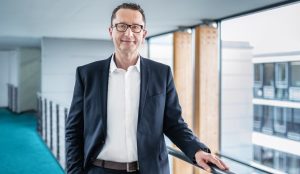The Alliance for the Strengthening of Digital Infrastructures in Germany has been working for the data centre industry in Germany since 2018. This year, envia TEL joined the initiative founded under the umbrella of the eco Association. Axel Schumann, authorised signatory and head of sales at envia TEL, introduces the company in a welcome interview, discusses challenges in the expansion of digital infrastructures, and shares envia TEL’s vision for Germany as a digital location.
To start with, we would like to get to know envia TEL even better: What core areas does your company cover? And what are three facts that everyone should know about envia TEL?
envia TEL GmbH (envia TEL), based in Markkleeberg, is the leading regional telecommunications service provider and network operator in Central Germany. The company offers products and services across the entire spectrum of telecommunications, services for network operators and cybersecurity solutions. With the “Leipzig Data Center Campus” and the “Hannover Data Center” (available from July 2025), envia TEL operates two of the most modern data centre locations in Europe, offering space for around 90,000 servers over an area of 5,000 square metres. Since 2022, the Leipzig Data Centre Campus has been home to the DE-CIX Leipzig regional Internet Exchange. With a fibre-optic network spanning approximately 7,000 kilometers, envia TEL reaches 40,000 businesses in around 350 industrial parks and 100,000 private households in the region. As a 100% subsidiary of envia Mitteldeutsche Energie AG (enviaM) and part of the E.ON group, the company employs more than 250 people in Chemnitz, Cottbus, Halle, Markkleeberg and Taucha.
What contribution does envia TEL make to the expansion of the fibre-optic network in your region? And how do you ensure that rural areas also benefit from high-speed Internet?
envia TEL has been actively expanding its fibre-optic network in Central Germany for more than 15 years. In addition to providing fibre-optic services to business customers in more than 350 commercial areas, the company is focusing on the commercial expansion of infrastructure in 10 municipalities in Central Germany. Furthermore, envia TEL is playing a major role in the subsidised municipal infrastructure expansion at the district level.
What role do your data centres play in envia TEL’s overall portfolio – and what makes them special?
The construction and operation of co-location data centres is a clear growth area for envia TEL. Currently, we operate two highly available and extensively certified data centres with a total capacity of 3,000 square metres at our campus in Taucha, near Leipzig. A new addition to the portfolio is our data centre in Sehnde near Hannover. As part of a joint venture with our E.ON sister company Avacon Connect, we are building a colocation data centre with a total capacity of 2000 square metres. Our motivation is to offer our customers standardised and homogeneous products and solutions in the critical infrastructure of a data centre. This also includes the 100% comparability between our data centres in terms of quality, equipment and certification. In terms of redundancy, our customers benefit primarily from the geographical distance between our data centres, in line with BSI recommendation of >200 kilometres. In addition, extensive and separately managed fibre-optic infrastructures ensure the interconnection of the data centres, with national and international network interconnection points – and with numerous other network operators.
What are the typical challenges in implementing your infrastructure projects? And what changes would facilitate the expansion of digital infrastructures?
Typical challenges in the expansion of digital infrastructure include the lack of available resources for cable installation, splicing and, above all, civil engineering. The civil engineering market has now become highly consolidated, and there is hardly any free capacity available on this scale. At the same time, various insolvencies are still ongoing, hindering rapid progress in expansion. Another challenge is the long approval times from construction authorities and offices. Permits are often issued very late, and parallel construction sites are usually rejected. It is therefore virtually impossible to accelerate construction activity.
A greater influence of cities and districts on their administrations could help remedy this situation. Ideally, telecommunications would be treated with the same importance as critical infrastructure such as electricity and gas in terms of supplying the population, which would significantly increase the scope for network operators in terms of construction, traffic regulations, etc.
What is your vision for Germany as a digital location? What projects are you planning to make this a reality? And what role does the Alliance for the Strengthening of Digital Infrastructures in Germany play in this?
The envia TEL vision for Germany as a digital location includes a future-proof, digital and resilient (sovereign) society, with positive experiences for all customers and citizens. To achieve this, envia TEL focuses primarily on the expansion of digital infrastructures (fibre optics and data centres), as well as on networking and security services and nationwide partnerships. In doing so, we are operating from Central Germany for the entire Federal Republic. To achieve this vision, strong alliances such as eco are needed, as they bring partners together with the goal in mind. Only by working together can we successfully address the challenges of our time.
Thank you for the interview!

The Alliance for the Strengthening of Digital Infrastructures is an association of leading companies in the industry. Founded in 2018 under the umbrella of eco – Association of the Internet Industry, the initiative aims to draw attention to the importance of digital infrastructures for Germany as a business location through dialogue with policymakers and the public.




